The West’s staunchest ally against ISIS is fighting on empty
Kurdish peshmerga forces are fighting off Islamic State. But with oil wealth drying up, an even bigger threat is spreading.
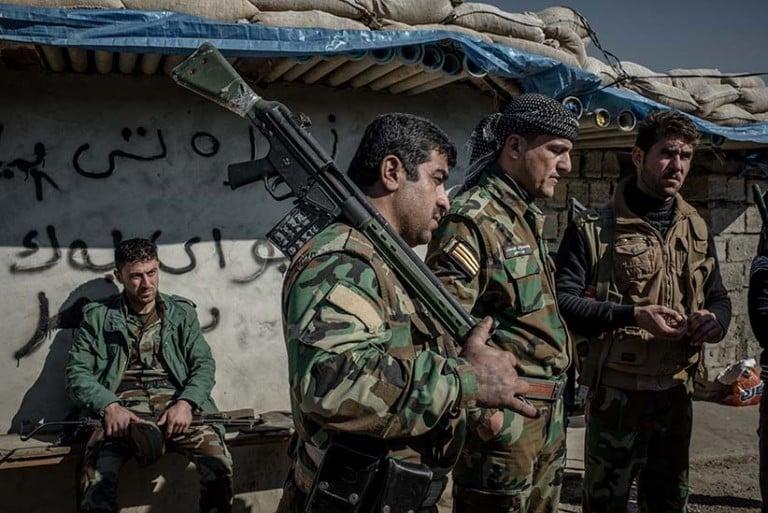
Peshmerga fighters at a frontline southwest of Kirkuk, Iraq. Many Peshmerga fighting ISIS haven’t been paid a salary over four months due to the economic crisis in Kurdistan. (Photograph by Cengiz Yar)
Share
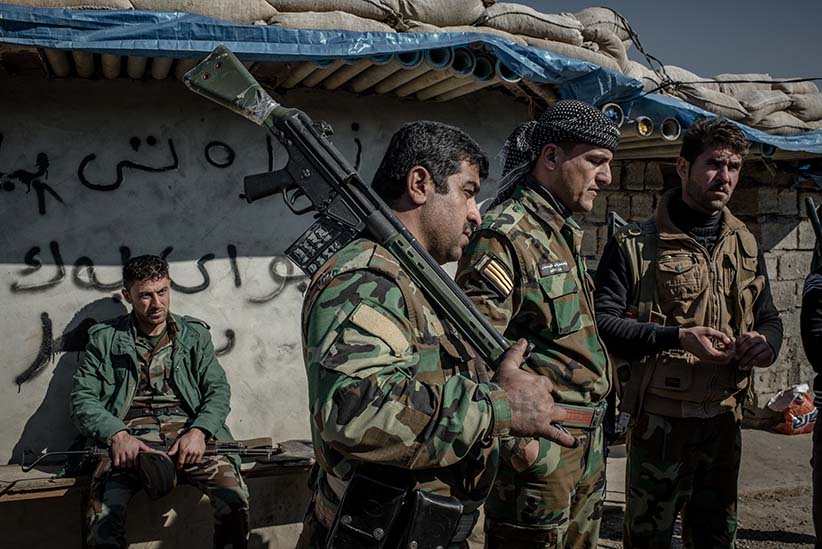
The men of the Second Unit, Third Peshmerga Brigade, no longer fear the suicide truck bombs that a year ago might at any time come lurching through the fields toward their positions. From a concrete bunker atop a bulldozed mound southwest of Kirkuk, their French-donated heavy machine gun points skywards over the heads of Arab farmers who have returned to till their land. A network of bunkers, berms, deep trenches and barbed-wire entanglements today protects much of Iraqi Kurdistan from Islamic State attacks. But the peshmerga fighters—the international coalition’s most stalwart ally in the fight against Islamic State, or ISIS—have other things to worry about, like paying rent.
Sherko Jabar explains the situation between drags on a slim cigarette. The 33-year-old fair-haired Kurd gets respect as a peshmerga but pays his bills as a cabbie. For the past five months he and his comrades haven’t received their salaries, so he spends his time off driving one of Iraqi Kurdistan’s ubiquitous beige taxis. The problem is, most of his fares haven’t received their salaries either. “Before my customers would just pay; now if I ask for 5,000 dinar [$6], they’ll haggle for 3,000 [$3.75],” Jabar says. “People are frustrated and they’re blaming the government.”
“My men aren’t fighting for money,” Jabar’s commander, a grizzled 47-year-old lieutenant colonel, Osman Abdullah Kareem, interjects. “Even if we aren’t getting our salaries we’ll defend Kurdistan against this ISIS threat.”
Further up the chain of the command, though, sits Gen. Rasul Omer Latif, and he’s furious. A storied and bombastic peshmerga commander, Latif commands the West Kirkuk sector from an office stuffed with gilt furniture in Karwan Camp outside the city of Kirkuk. He recounts a recent radio appearance: “I told them, if you [the Kurdistan Regional Government] don’t pay our peshmerga, I’ll kill you myself. We’re talking about revolution here!”
He laughs, softening the mood. Which is just as well, because he’s an imposing man, who says he has fought in 23 military operations during his 28-year career and been wounded six times, including losing a foot fighting another extremist Islamist group that preceded ISIS. “Of course this is just talk and we’ll talk more, but if that doesn’t change things, well . . . ” he leaves the threat hanging.
Iraqi Kurdistan is broke and its people angry. While the government scrambles to introduce reforms, Kurds are asking where the money went. While low oil prices are a decidedly more mundane menace than ISIS, they are now also a more real one. As a trip across the troubled region reveals, it’s not just Kurdish dreams at stake, but the security of the region and beyond.
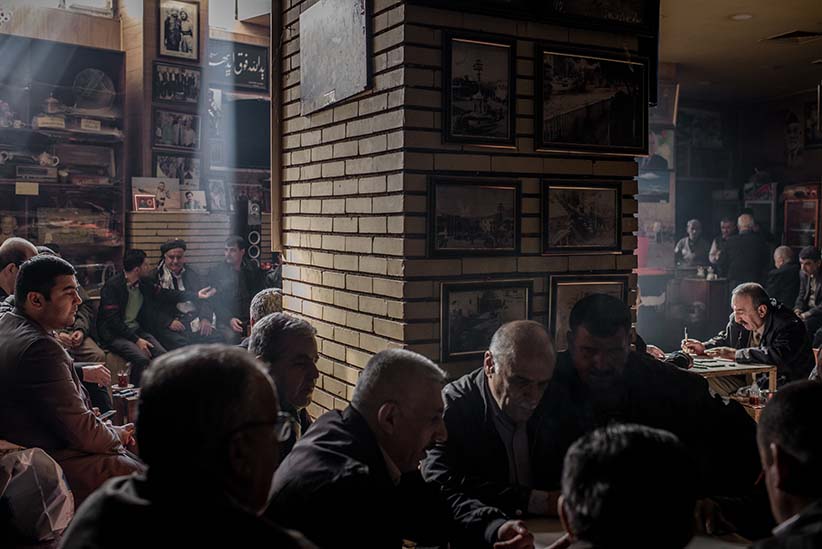
Just a few years ago, Iraqi Kurdistan was booming. Arriving back in 2012, Ayad Jaff rode the wave at its crest. A trim realtor with gelled hair, Jaff was well placed to succeed after a decade overseas working in real estate in Norway and Greece. From his office in a half-finished housing development on the outskirts of Irbil, Jaff recounts how quickly Iraqi Kurdistan’s capital was transforming from a sleepy backwater into a sprawling gold-rush city breathlessly promoted as a “new Dubai.” To illustrate, he cites a deal where a villa bought for $140,000 in 2013 sold a year later for $280,000; that was standard. “Just imagine,” Jaff recalls wistfully.
Such prosperity was unimaginable in the 1990s, when Iraqi Kurdistan languished under international sanctions and isolation from the rest of Iraq, and was a big reason why men like Jaff sought lives abroad. But a decade of prosperity after the 2003 U.S.-led invasion drew thousands of Kurds back, not to mention foreign investors. Iraq’s constitution granted the region political autonomy and, importantly, 17 per cent of the country’s enormous oil revenues.
Former enemies the Kurdistan Democratic Party and the Patriotic Union of Kurdistan Party came together to form the Kurdistan Regional Government (KRG) in 2005, which spent billions on subsidies and expanding its payroll, while the two parties continued to vie to purchase influence.
Offering land for development was a major way in which patronage was allocated and property speculation hit dizzying heights, Jaff says. An electronic money counter on his desk recalls times when businessmen kept laptop bags of U.S. dollars or flour sacks of dinar in the trunks of their cars to seal deals on the spot. “Cash was everything,” he says. “I knew a taxi driver who became a millionaire in three years.”
The wave crashed even faster than it peaked. Across town in another upmarket development—this one called Dream City—Dlawer Ala’Aldeen is sipping his morning coffee. Originally a U.K.-trained microbiologist, Ala’Aldeen was later a minister of higher education and scientific research in the KRG before becoming the president of the Middle East Research Institute (MERI), a local think tank. He explains that Kurdistan’s boom was dependent on a single factor: high oil prices. A failure to build a tax base or diversify the economy left it vulnerable. “But its weaknesses did not show for as long as there was a good flow of cash,” he says.
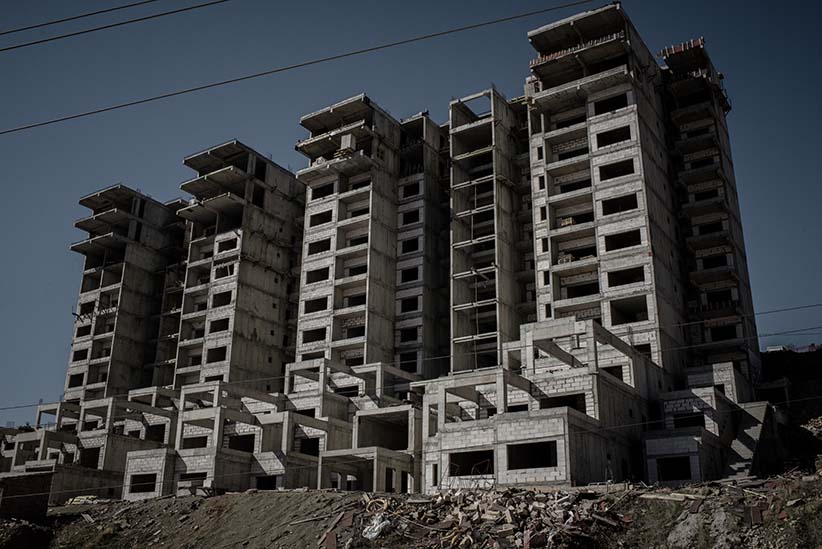
In the summer of 2014, the ISIS advance across northern Iraq drove a million Iraqis to seek shelter in Kurdish regions and finally broke itself against the determined peshmerga’s defences. The cost of the war and its attendant humanitarian crisis would have been burdensome during the boom, but earlier that year the Iraqi federal government had cut budget payments to the KRG in a dispute over the Kurds’ right to export oil independently. The Kurds ramped up independent exports, even as prices fell toward their lowest level in a decade.
“The equation is simple for the government,” Ala’Aldeen concludes. “The amount of income they generate is less than the amount they need to keep the system running.”
For two years, the KRG fell behind in payments to oil companies, halted investment in infrastructure projects, and raided local banks for loans. By January this year, with oil below US$30 a barrel, the government was panicking.
The KRG president’s office, the prime minister’s office and the ministries of finance and natural resources are all frantically trying to implement a reform plan and too busy to meet with a journalist. Eventually an economic adviser to the prime minister agrees to a phone interview.
The KRG earned approximately $620 million for the 18.7 million barrels it exported during January (the price discounted from Brent crude to account for quality, transportation cost and political risk), the adviser said. The KRG’s monthly payroll alone is over $1 billion.
Unable to print money or easily take out international loans, the KRG looked to slash the budget. The payroll—which accounts for 70 per cent of expenditures—was the biggest target. On Jan. 27, the KRG announced a plan to cut all public salaries—except the peshmerga and security services—by between 15 and 75 per cent. The public was not impressed.
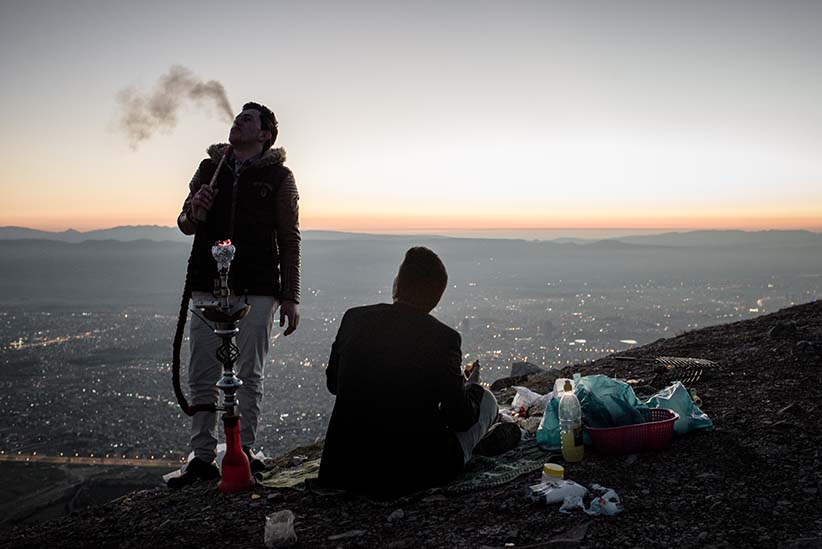
A 2½-hour drive from Irbil, Iraqi Kurdistan’s second city, Sulaimani, is opposition heartland. It’s here that anti-government sentiment is hardening. Set amid a picturesque ring of hills, the city didn’t experience the same unchecked development as Irbil, although the boom times did bestow upon it an American university, an international airport, and a 253-room luxury hotel with revolving rooftop restaurant. Recently it’s been given a new nickname: the strike capital.
The green linoleum hallways of Shoresh General Hospital are eerily quiet. The hospital has one of two public emergency departments in Sulaimani. Ordinarily 15 doctors treat around 200 patients daily. On a recent afternoon, however, 28-year-old orthopedic resident Ahmed Hassan is one of four doctors on shift and the emergency room’s capacity is reduced to 50 patients. “We’re turning the rest away because we’re unable to see them all,” Hassan says.
A tour of the hospital’s storeroom reveals a lack of basic medications like Tylenol. “We lack plates to set bones,” says Hassan. “Most of the time we have to tell patients to go and buy the kits themselves.” Unpaid for five months, many doctors have stopped coming to work. Some—Hassan estimates 10 per cent—have left for Europe. They join some 37,000 from Kurdistan who have left since 2014, according to estimates by the International Federation of Iraqi Refugees.
Across the region, striking staff are closing hospitals. They’re joining policemen, judges, university staff, teachers and other civil servants in shutting down public institutions. Even when not picketing, civil servants have mostly stopped turning up to work. Shoresh will stay open, though, Hassan insists, if only because it treats wounded peshmerga. “We feel obligated to serve them as they’re giving their lives to defend us.”
But Hassan and his colleagues are furious at the proposed pay cuts. “A doctor’s salary is about $1,000 [per month], now they’re saying it’s going to be $500, can you imagine what that does to people already in debt?” asks Hassan. “The government says we have to tolerate the situation, but people blame corruption.”
Corruption is referenced constantly by Kurds who believe that the political elite have syphoned the region’s oil wealth. But blaming corruption is—at most—a partial explanation, according to those with an understanding of the KRG’s finances. “The problem runs deeper,” says Djene Bajalan. “It’s a structural issue and people haven’t accepted that yet.”
Bajalan is a dual-ethnicity Welsh Kurd who lectures on Kurdish history and politics at the American University of Iraq at Sulaimani (AUIS). Set on an attractive campus on the road out of town, the institution was established in 2007 with a view to bringing Western liberal arts educations to Iraq. Today Bajalan shares an office with three other staff members—a result of the AUIS’s own economic reforms, which started much earlier than the KRG’s.
In its early years AUIS spent millions to attract foreign academics. “They vastly overspent,” Bajalan says. When the money ran out they made cuts to salaries and the university’s administration; doing away with free cookies, taking out lights to save electricity, even removing paper towels from the toilets. “AUIS is probably the most efficient thing in Kurdistan right now,” Bajalan says.
With Kurdistan now going through its own tough transition, Bajalan says unrealistic expectations are still an issue. “Politicians were telling the people that we were going to be like Gulfi sheikhs, which was code word for ‘no one will have to work any more,’ ” says Bajalan. “The social contract was that you don’t complain too much as long as we feed you and provide light work. That economy is no longer possible.”
He references a tweet by deputy prime minister Qubad Talabani that sums up the situation: “We have a staggering 1.4m people paid by the government. Easy when oil price is $100 per barrel. Very hard @$28”
Roughly three in four working-age Kurds receive a government salary. Many don’t even have job titles. An unknown number are “ghost” employees, who collect salaries without working. So far, reform proposals have not addressed this. “There has been no decisive decision on cutting the number of employees yet,” says Dara Khailany, an economic adviser to Talabani. “But a committee will be looking into that.”
Even the opposition Gorran movement, whose name means “change” and which formed in 2008 aiming to reform Kurdistan’s patronage system, is not supportive of deep payroll cuts. Sardar Aziz, a parliamentary adviser for the movement, says he does not believe that civil servants should be punished without reforming a system that only empowers the political elite. “My fear is that the government thinks if they are able to pay the man with a gun, they will be able to abandon the rest,” he says over a crackling phone line. “Kurdish people don’t want to see their country become somewhere like Syria but slowly, slowly everything will crumble.”
International observers are also watching with concern. Maria Fantappie is the Iraq analyst for the International Crisis Group, an NGO which tracks developing conflicts. On a call from her office in Istanbul, she notes that deputy prime minister Talabani has been warning for months that the risk of economic collapse is now the biggest threat to the region. “ISIS undoubtedly is a security threat but the larger problem is to govern your people well,” she says. “If you cannot do that you will face spread dissatisfaction, unrest and foreign interference.”
The worst case scenario—an implosion—has precedent in the 1990s, when the Kurds fought a brutal civil war. While most believe that erstwhile enemies the KDP and PUK have too much to lose by resuming outright hostilities, Fantappie notes that the same anger and distrust of government that sparked violent protests in October is intensifying. “This sort of dissatisfaction can be easily monopolized by a political group who want to use this to their advantage,” she says.
Bajalan agrees, suggesting that with a diminished financial pie, “you’re going to see more fighting over the slice that’s left.”
In speaking to Kurds, a clear generation gap emerges: those who grew up in the good times are angry, while the older are more stoic. MERI’s Ala’Aldeen finds optimism in the belief that oil prices won’t drop any lower. “If people withstand the pressure now for a few months while it gets worse, inevitably there will be recovery,” he says.
Tolerating hardship will be easier for those who have been through it before, says Gen. Latif. “If your stomach has gone hungry once, the second time isn’t as bad.”